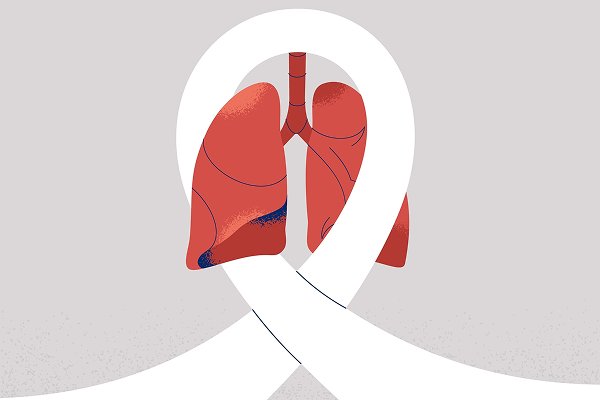
Almost always regarded as one of the most powerful foes in the oncology domain, lung cancer has, however, evolved into a domain of hope. Early detection, a precise understanding of its subtypes, and a revolutionary sort of treatment have awakened new hopes for the question, "Is lung cancer curable?"
For us, these advances have evolved into a murmur of hope and clarity for patients and families surmounting the severity of this heavy diagnosis, as our cancer care unit and expert oncologists in Delhi are now among the leaders in the evolving world of cancer treatment. In this blog, we unravel the key aspects of lung cancer—its causes, types, early signs, detection methods, curability, and the latest personalised treatments.
Synopsis
- What Causes Lung Cancer?
- What are the 4 Types of Lung Cancers: Every One Isn't Alike
- Early Signs: Spot the Subtle Indicators and Act Early
- How Do You Detect Lung Cancer? Role of Modern Technology
- Is Lung Cancer Curable? The Evidence and the Hope
- How to Treat Lung Cancer in a Personalised Way
- Conclusion
What Causes Lung Cancer?
The major perpetrator of lung cancer is still tobacco smoke. However, it is not the only causative agent. Environmental exposures such as radon, asbestos, and atmospheric pollution may also constitute a threat. For those curious about what causes lung cancer, it is important to recognise both lifestyle and environmental factors in risk assessment.

What are the 4 Types of Lung Cancers: Every One Isn't Alike
The four principal kinds of lung cancer include:
|
Type |
Description |
|
Non-Small Cell Lung Cancer |
The common kind. Includes adenocarcinoma, squamous cell carcinoma, and large cell carcinoma. |
|
Small Cell Lung Cancer |
Aggressive and fast-growing, particularly associated with smoking. |
|
Lung Carcinoid Tumours |
Rare and slow-growing, and usually indicating a better prognosis. |
|
Other Rare Subtypes |
Including sarcomatoid carcinoma and other types. |
If you have ever wondered what the 4 types of lung cancer are, it is crucial to understand these distinctions for effective management.
Early Signs: Spot the Subtle Indicators and Act Early
Due to the nature of lung cancer, the early symptoms may barely be manifested or may be mistaken for symptoms of another less serious disease.
-
Most patients narrate their experiences as beginning with persistent coughs, unexplained weight loss, chest pain, or recurrent respiratory tract infections. These are very common early manifestations of lung cancer.
-
Others claim that breathlessness and hoarseness come on slowly.
If you are searching for what are the early signs of lung cancer, these symptoms should never be ignored.
How Do You Detect Lung Cancer? Role of Modern Technology
While the detection of lung cancer has always been a difficult task, modern medicine bestows the luxury of a powerful array of techniques in lung cancer detection.
-
Low-dose computed tomography (LDCT) has emerged as a game changer, allowing cancers to be identified at an early stage.
-
Other modalities of intervention include PET-CT, MRI, bronchoscopy, and molecular testing, all housed in the state-of-the-art cancer centre at Manipal Hospital Delhi.
When patients ask how to detect lung cancer, our skilled oncologists in Delhi emphasise the importance of advanced imaging and molecular diagnostics for early and accurate detection.
Is Lung Cancer Curable? The Evidence and the Hope
Lung cancer, if diagnosed at a localised stage, would be amenable to cure. However, for advanced or metastatic disease, prolonging survival and improving the quality of life take precedence.
Recent advances in screening, diagnosis, and treatment have brought a new impetus for improving the survival rates for lung cancer.
For those who ask, can lung cancer be cured? The answer increasingly depends on early detection, precise diagnosis, and access to innovative therapies.
How to Treat Lung Cancer in a Personalised Way
Nowadays, therapies for lung cancer are highly personalised beyond conventional surgery, chemotherapy, and radiotherapy treatments:
-
Surgery: For early stages with localised tumours.
-
Target Therapy: When mutations are actionable based on EGFR, ALK.
-
Immunotherapy: Uses the immune system to kill cancer cells.
-
Radiotherapy: For local control or symptom palliation.
-
Combination Regimens: Increasingly used for aggressive or late disease.
If you are seeking guidance on how to treat lung cancer, our lung cancer specialists in Delhi provide personalised plans that integrate the latest advancements in oncology.
Conclusion
Progress in Survival: A New Dawn
Recent advances in screening, diagnosis, and therapy have led to notable improvements in lung cancer survival rates. At Manipal Hospital Delhi, we work alongside a community of dedicated oncologists who continually strive to expand the possibilities in lung cancer treatment, ensuring patients receive the most up-to-date and effective care available. Book an appointment now!
FAQ's
Lung cancer, when at an early stage, especially when localised, is potentially curable with surgical procedures like robotic surgeries. Early diagnosis is of utmost importance to achieve good results.
Persistent cough, chest pain, unusual weight loss, difficulty in breathing, and repeated respiratory infections are some common early signs.
Low-dose CT screening is advised for high-risk individuals. If you are wondering how to detect lung cancer before symptoms, LDCT is the recommended screening tool.
The four main types include non-small cell lung cancer, small-cell lung cancer, carcinoid tumours of the lungs, and the rare subtypes. Understanding what are the 4 types of lung cancer is essential for developing an effective treatment strategy.
Manipal Hospital Delhi offers the best combination of an advanced cancer diagnostic centre with a multidisciplinary group of oncologists and the latest therapies. If you are considering how to treat lung cancer, our hospital provides comprehensive support at each step.





















 5 Min Read
5 Min Read

















